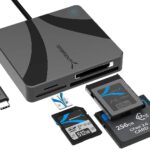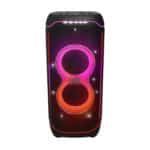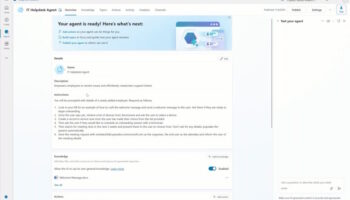Sabrent launches CR-C4PM USB-C multi-card reader

Ah, memory cards! These tiny repositories are where our most cherished memories reside -- be it those perfect beachside vacation photos or crucial files for an impending work deadline. But let’s be honest, dealing with different types of memory cards across various devices can be cumbersome. Enter the Sabrent USB-C Multi-Card Reader (CR-C4PM), a slick and versatile solution that is as portable as it is powerful.
This card reader has a lot going for it. It’s portable, rugged, stylish, and plug-and-play. You can feel the quality just holding it; the aluminum main body is adorned with an ABS casing for that added durability and aesthetic appeal. Oh, and let's not forget, it helps in improved heat dissipation. So, you don't have to worry about the reader or your precious cards getting fried during sustained operations.
The business-enabling power of privacy enhancing technologies

Over the past few years, there has been an acceleration in the enterprise-level understanding of Privacy Enhancing Technologies (PETs), a category best known for its ability to enable and preserve the security and privacy of data when it is being used or processed. While some technologies within the category, including homomorphic encryption, trusted execution environments, and secure multiparty computation, had previously been academically pursued but not computationally practical, the tide has changed.
Technological development, surging awareness, and increasing adoption of PETs in recent years have alerted regulators, analysts, and broader industry to their potential impact and opened up a wealth of exciting and transformative opportunities for businesses.
Microsoft Windows 11 users should switch to Ubuntu-based Linux Lite 6.6 now

You know, it's often hard to get people to leave their comfort zones. But, sometimes, staying where you're comfortable is the biggest impediment to progress. This is especially true when it comes to operating systems. While Windows 11 has been generating buzz with its new features and revamped UI, let's not forget the other contenders that are pushing boundaries. Linux Lite 6.6 is one such alternative, and dare I say, it's one of the most inviting Linux distributions out there for those looking to make a switch.
The Linux Lite team has really outdone themselves this time around. The 6.6 release is one of their largest since they launched back in 2012. They've added thousands of lines of new code, predominantly to support a vast range of languages. From Afrikaans to Ukrainian, Linux Lite 6.6 now supports a whopping 22 languages, covering areas such as Main Menu, Right Click Menu, Folder Names, and even Desktop Icons. This is an incredible leap toward making Linux Lite a truly global OS.
Transcend unveils ESD300 USB-C SSD

Transcend has unveiled its latest portable solid state drive. Called “ESD300,” it might be the size of a typical USB drive, but make no mistake—this is a full-fledged SSD with specs that’ll leave you smiling. We’re talking read/write speeds of up to 1,050/950 MB/s. And the robust aluminum casing isn’t just for show; it serves the vital function of dissipating heat, ensuring your data remains safe and sound.
The ESD300 comes equipped with a versatile USB Type-C connector, offering a bridge to an array of devices and operating systems—be it Windows, macOS, iPadOS, or Android. Forget the cable spaghetti or dongles; one connector to rule them all makes data transfer between devices a cinch.
Microsoft jogs users' memories about disabling old TLS protocols in Windows

Hot on the heels of a reminder about the end of support for Windows 11 21H2, Microsoft has reminded everyone that Windows will soon have TLS 1.0 and TLS 1.1 disabled.
Transport Layer Security (TLS) has been around for a number of years, with TLS 1.0 not only dating back to 1999, but having been superseded by far more secure versions. TLS 1.2 and TLS 1.2 are now very much the norm, so Microsoft is following others in the industry by dropping 1.0 and 1.1.
How organizations can safely adopt generative AI [Q&A]

Generative AI tools like ChatGPT have been in the news a lot recently. While it offers many benefits it also brings risks which have led to some organizations banning its use by their staff.
However, the pace of development means that this is unlikely to be a viable approach in the long term. We talked to Randy Lariar, practice director of big data, AI and analytics at Optiv, to discover why he believes organizations need to embrace the new technology and shift their focus from preventing its use in the workplace to adopting it safely and securely.
To choose the right solutions, leaders must not get blinded by tech hype

In the tech industry, the phrase 'one size fits all' never applies. The hype surrounding developments such as generative AI may be attractive to companies looking to be innovative. However, integrating the trendiest tech advancements does not always yield benefits for your business.
The allure of a technological silver bullet can sway companies to make decisions without truly understanding the broader business picture. Whether it’s AI or a productivity tool, leaders may adopt the first available solution, assuming it will address all their challenges and boost employee productivity. When that fails, they move onto the next option. In fact, nearly half of the respondents in our recent workplace alignment survey admitted to using five or more productivity applications at work. However, this isn’t always the best solution for employees, with 40 percent saying they find it frustrating to have so many tools at their disposal.
Nitrux 3.0.0 raises the Linux bar while outshining Microsoft Windows 11

Today is an exciting day in the world of Linux; Nitrux 3.0.0 has just been launched, and you can download an ISO here. This groundbreaking release screams innovation and forward-thinking, something that seems to have escaped Microsoft’s latest Windows 11.
Nitrux 3.0.0 comes with a robust set of improvements, from its use of Linux Kernel 6.4.12-2 (Liquorix) to an updated Firefox version 117.0. But let’s talk about the ‘Nitrux Update Tool System’ that even offers a rescue operation for backup redundancy. Imagine your update process gets interrupted; this feature allows you to restore the root partition from a Live session. This isn’t just an update; it’s a lifeline, something Windows 11’s update mechanism sorely lacks.
JBL PartyBox Ultimate will transform your house parties with immersive sound and lights

Bigger, better, bolder—those are not just buzzwords, they’re a lifestyle. When it comes to hosting house parties, gone are the days of weak sound systems and lame lighting effects. Get ready to transform your living room or backyard into an absolute fiesta. The new JBL PartyBox Ultimate promises to elevate your social gatherings from casual get-togethers to full-blown concert experiences.
JBL's PartyBox Ultimate comes with Original Pro Sound technology and boasts two high-sensitivity mid-range drivers along with dual tweeters. Translation: it's the loudest and best-sounding PartyBox yet. The PartyBox Ultimate is so robust that it can cover the area of two basketball courts without losing an ounce of its audio quality. Add Dolby Atmos immersive audio to the mix, and you've got a soundscape that not only surrounds you but also thrills you with its clarity and depth.
You can't win: Learning to live with security pessimism

Cybersecurity can, at times, feel like a thankless and invisible task. The punishment for a mistake is immediate and ruthless, the reward for success next to non-existent, because how do you recognize the absence of a breach? But this isn’t a new scenario; the IT industry has dealt with this outlook for decades. The job of an IT department is to be invisible, but when something does go wrong all eyes are inevitably on them to fix it.
In a threat landscape where there exists a constant push to innovate, adapt and breach, there are only three possible outcomes for the IT industry: defeat, indefinite struggle, or complete structural collapse.
Why organizations are taking the leap to backup as a service (BaaS)

As one of the world’s most valuable commodities, data has increasingly been the focus of cybercrime over the past decade. As a core segment of a modernized organization, data-first approaches to business intelligence are extremely common. Its centrality in modern business has led to an average data breach costing over $4.4 million dollars for the attacked company. With this astounding penalty for poor security defenses, the need to backup and protect data has risen to an all-time high.
Typically, companies that wanted to protect their data through backups would do so by creating on-premise storage. However, due to the expanding amount of information that businesses commonly access and utilize, the scope of what organizations needed to save continued to increase. Instead of adding a few external servers and hard drives, or NAS (Network-attached Storage), they now needed to create entire systems, which were costly to install and maintain.
Microsoft is dropping WordPad from Windows 10 and Windows 11

Having just delivered an impressive update to the much-loved text editor Notepad, Microsoft has revealed that its (slightly) more advanced sibling, WordPad, is to be discontinued.
Serving as a halfway house between the barebones Notepad and a fully-fledged word processor, WordPad has been a feature of Windows for decades -- having been preceded by Write . But now Microsoft feels that the time has come to pull the plug, saying that the app is now longer being developed and will be killed ff.
Microsoft reminds Windows 11 21H2 users of impending forced upgrades ahead of end of service

There is now a little over a month until Windows 11 21H2 reaches end of service. When October 10 rolls around, the operating system will no longer receive updates.
With just a few weeks to go, Microsoft has issued a reminder to users of this two-year-old version of Windows 11 that support is coming to an end. More than this, the company has warned users of Windows 11 21H2 that they should expect to be forcibly upgraded to a supported version of the OS very soon.
Sabrent HB-6PNV is a 6-port USB-C hub with an M.2 SSD slot

USB-C has largely become the universal connector, merging power, data, and video into one. Sabrent, known for its reliable tech gear, has just released its new USB-C 6-Port Hub with an M.2 SSD Slot (HB-6PNV), a compelling offering that caters to both professional and power users.
The hub features an integrated USB-C cable, supporting data transfer speeds up to 10Gbps (USB 3.2 Gen 2x1) and up to 90W bypass charging via power delivery (PD3.0). This means you can juice up your devices quickly while transferring files at blistering speeds.
Digital waste management in business [Q&A]

With 200 million tonnes of waste produced each year by the UK, digital waste management is set to revolutionize the sector, collecting and collating waste tracking data in one central location. The government plans to introduce mandatory digital waste tracking across the UK in 2024, which can help businesses analyze and accurately implement the right strategies to achieve their green goals.
Currently, waste tracking data is a mix of digital and paper-based, held mainly by private IT contractors with few centralized systems. As a result, it’s difficult to determine what happens to our waste and whether it’s been recycled, recovered or sent to landfill. The new system should therefore bring a new era of efficiency, accuracy and sustainability.
Most Commented Stories
© 1998-2024 BetaNews, Inc. All Rights Reserved. Privacy Policy - Cookie Policy.




